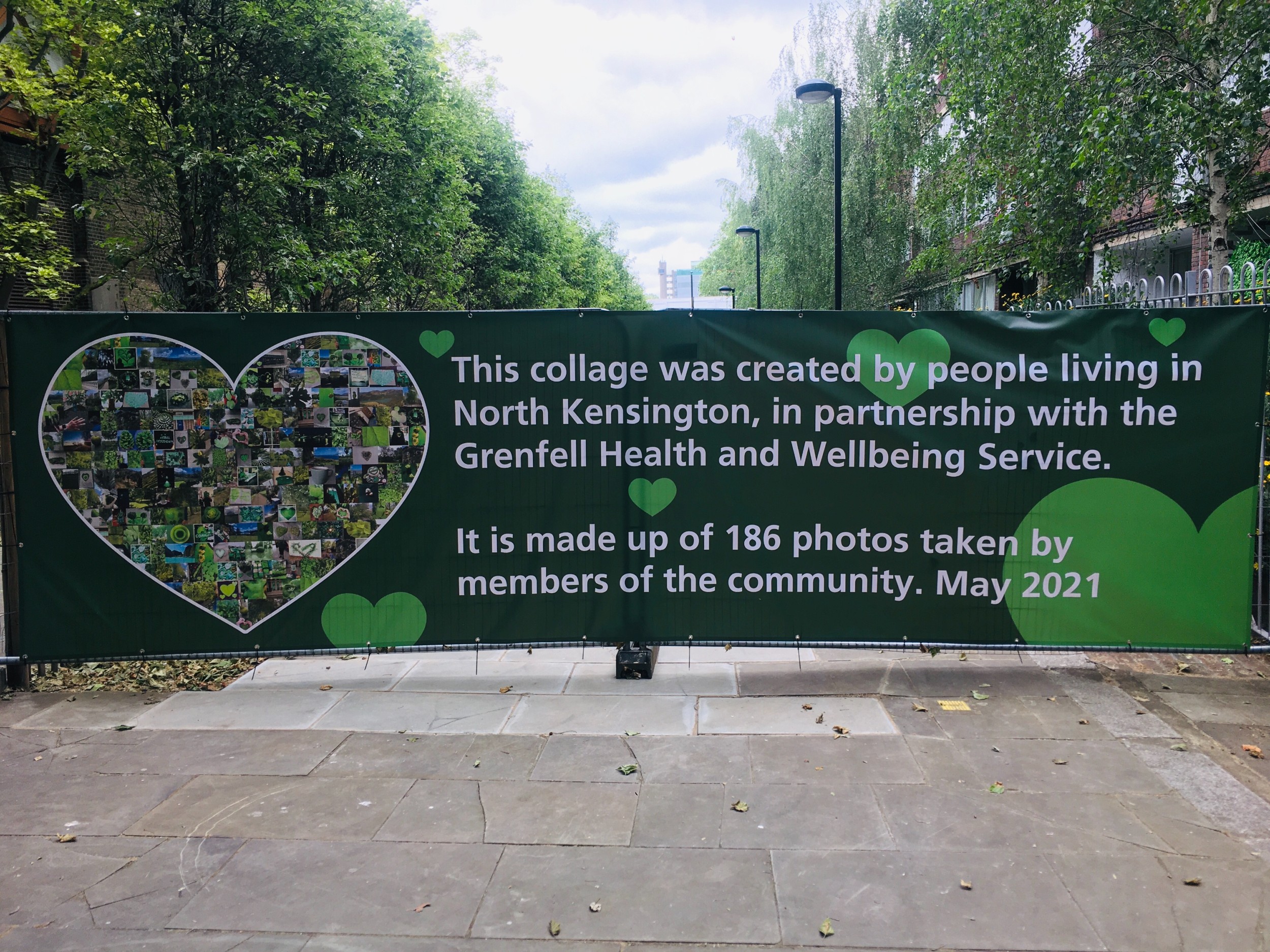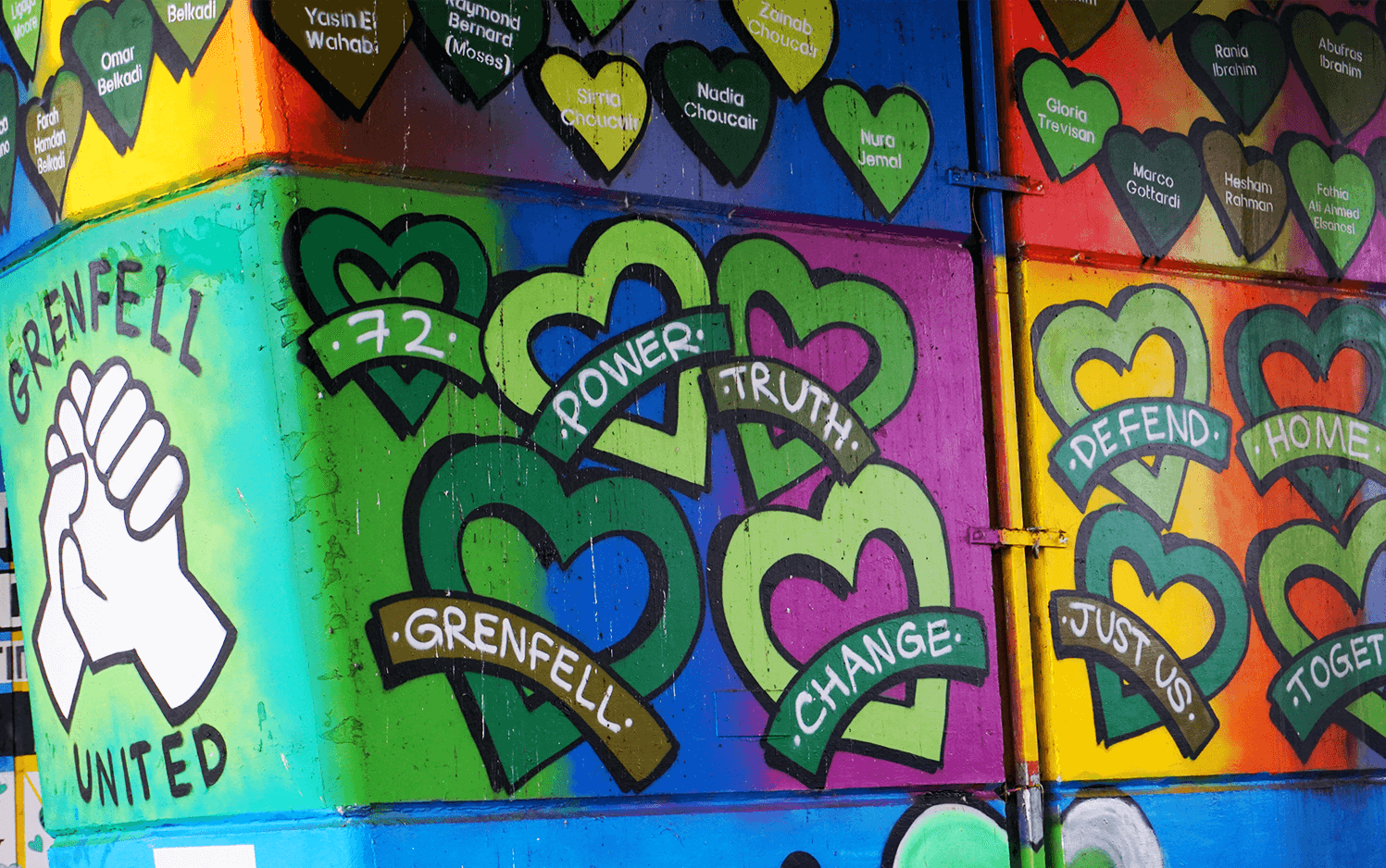Explore some of our community collaborations

We have 3 main arms of our community collaboration team; Workshops, Clinical Collaborative Groups, and Supporting the Supporters.
Grenfell Recovery College Workshops
The content of each Recovery College workshop is co-produced with people who have lived experience of mental health difficulties and each session is delivered by a clinician from our team and a service user with experience of accessing the Grenfell Health and Wellbeing Service.
We are always open to visiting local groups to think about what workshop topics would be useful to them then designing a short programme of workshops we can deliver together. We can deliver workshops on line and in person and welcome suggestions about subjects you would like us to cover which aren't currently in our prospectus.
If you would like a workshop/series of workshops delivered to the people you are working with or have any suggestions for new topics, Click here: Grenfell Recovery College :: Grenfell Health and Wellbeing Service (cnwl.nhs.uk)
Collaborative Therapeutic Groups
Group therapy is a useful way for people who share a common issue to get support and advice from each other and can be a very powerful part of their recovery journey.
Groups offer a unique experience that we cannot get from one-to-one therapy. For some people the idea of participating in group therapy might seem intimidating at first, but most who go on to try them do see a benefit. They not only help to ease that sense of isolation, but also give the opportunity to share your experiences in a way that can be meaningful to yourself and others.
We can offer many groups in collaboration with resident groups and organisations working with local residents affected by Grenfell.
Below are some examples of the collaborative projects we can deliver. To find out more about information about the support we can offer to staff from local organisations, visit the Supporting the Supporters page.
People in the Grenfell community got their cameras out and took nearly 200 photographs, which the NHS compiled to make one massive heart collage, ahead of the fourth Grenfell anniversary.
A series of new virtual reality films featuring former England striker Les Ferdinand. They feature Les talking about his thoughts, emotions and body sensations in the moments before his debut for England as well as a 360 discussion about coping strategies and stigma.
Arts and creative therapies are treatments which involve art activities within therapy sessions.
These sessions are supported by trained Arts Therapists with specialisms in Dance and Movement, Drama and Art Psychotherapy.
People don’t need to have any skills or experience in art and people of any age can benefit from them.
Different people will have different experiences of arts and creative therapies, but in general they aim to:
• Allow you to communicate thoughts and feelings that you find difficult to put into words
• Help you make sense of things and understand yourself better
• Give you a safe time and place to explore your emotions
• Help you find new ways to look at problems or difficult situations
• Help you to talk about complicated feelings or difficult experiences
The Tree of Life is a hopeful and inspiring approach to working with people who have experienced hard times. This methodology was co-developed through a partnership between Ncazelo Ncube, an educational psychologist and narrative therapist and David Denborough, a community worker and teacher at the Dulwich Centre for Narrative Therapy. Tree of Life is informed by narrative ideas and South African psychology.
This approach enables people to speak about their lives in ways that makes them stronger. It involves people drawing their own ‘tree of life’ in which they get to speak of their ‘roots’ (where they come from), their skills and knowledges, their hopes and dreams, as well as the special people in their lives. The participants then join their trees into a ‘forest of life’ and, in groups, discuss some of the ‘storms’ that affect their lives and ways that they respond to these storms, protect themselves, and protect each other.
The Tree of Life enables people to speak about their lives in a way that strengthens their relationships with their own history, their culture, and significant people in their lives. People can say as much or as little as they like about the difficult experiences they have faced throughout their life.
Tree of Life is a narrative approach (giving the stories of our lives meaning) and has been used in various communities around England and the world, in many different contexts such as with groups of migrants, communities who have suffered from a disaster, women who have been subject to abuse and many others. Tree of Life has a particular emphasis on culture and heritage so can be a helpful approach in ethnically diverse communities.
Practicalities: Can be delivered flexibly; either a one day workshop or a 4 week course of 2 hour sessions. The workshops are face to face and can be delivered in partnership with organisations or with specific groups/schools.
Ideally, up to 12 participants with 2 or 3 members of staff delivering. If a member of the partner’s team has had experience facilitating wellbeing groups then they would be welcome to co-deliver with our team members.
Team of Life is a group programme for children and young people aged 8-16, which uses sporting metaphors as a way of building strength and resilience within a group environment. Young people identify their ‘team mates’ who are the people who support them in their life, ‘goal keepers’ the person who protects their goals, and ‘coach,’ the person who helps build their strengths, among other roles in their lives. As a community practice, the aim is that the young people will begin to develop an appreciation of those in their team and an awareness of that they can contribute to their community.
Practicalities
The full Team of Life programme consists of 10 x 1 hour sessions, or can be adapted to be delivered as 5 x 2 hour sessions or 2 full days. This can be delivered in schools or community settings, either with existing or new groups of young people.
Although the Team of Life programme is largely classroom based, we interweave games and physical exercises to help with engagement and enjoyment.
We have also developed a 2 hour ‘Team of Life taster’ session, which is aimed at giving a flavour of the Team of Life programme. This can be offered as a standalone workshop or as a chance for groups to decide whether they would like to sign-up to the full programme.
We have also worked very closely pulling together a Football-themed resilience programme for young people hosted by the NHS and QPR Community Trust. You can find out more by visiting our youtube channel.
Recipes for Life is an approach that combines talking therapy with cooking and eating, and provides a culturally sensitive way of talking about wellbeing, resilience and recovery.
The Recipe for Life course is a hopeful and inspiring approach to working with people who have experienced hard times. The course* is based on the Tree of Life (see earlier slide) and the approach is informed by narrative ideas (giving the stories of our lives meaning) and South African psychology which has been used in various communities in many different contexts such as with groups of migrants, communities who have suffered from a disaster, women who have been subject to abuse and many others. Recipe for Life has a particular emphasis on culture and heritage so can be a helpful approach in ethnically diverse communities.
This approach enables people to speak about their lives in ways that makes them stronger. It involves people developing their own ‘recipe for life’ where we explore as a group the ‘ingredients’ that are the special, skills, knowledge and qualities needed for dealing with certain experiences of life. We would also explore the ‘method/techniques’, which are the things that help us bring out the best in our ‘ingredients’.
The Recipe for Life course enables people to speak about their lives in a way that strengthens their relationships with their own history, their culture, and significant people in their lives. People can say as much or as little as they like about the difficult experiences they have faced throughout their life.
Practicalities
The Recipes for Life course is normally a 4-week course of 2- hour sessions and is a mixture of talking, cooking and eating. However we can adapt to different time frames i.e. 1 full day, two half days etc to suit your needs.
We are offering a new short-term treatment to help people suffering with the after-effects of trauma.
It’s a therapeutic group based on a treatment known as EMDR – Eye Movement Desensitisation and Reprocessing therapy. EMDR is an effective way of helping people get relief from trauma or post-traumatic stress disorder (PTSD). People remain in control and fully alert and it has been shown to reduce the disturbance of traumatic memories and is an officially-approved NHS treatment.
Group EMDR or GTEP (Group Traumatic Episode Protocol) was developed by an EMDR trainer called Elan Shapiro. It involves drawing and writing things about a bad memory you have on a piece of paper and using tapping and left-right eye movements to work through a bad memory or trauma.
Practicalities:
GTEP can be delivered with established groups in the community who have experienced traumatic events and would like to process those memories together- a benefit of GTEP is that you do not have to disclose those memories to the group if you do not want to so whilst you are with people, they will not know the memories you are focusing on.
When joining a community group or staff group we would usually book in 2 sessions of up to 2 hours to start with and see how people feel then can book in more if they find it helpful.
The Compassionate Mind Group is based on the principles of promoting mental and emotional wellbeing by encouraging compassion towards the self and others. This can be especially helpful for those of us who struggle with self-criticism and associated difficulties such as anxiety, depression, guilt, shame and low self-esteem.
It is a skills-based group which involves weekly exercises. You can find more information on Compassionate Mind Therapy on this website: https://www.compassionatemind.co.uk/
Practicalities
This is a 10-12 week programme with sessions lasting up to two hours.
We have adapted the group for young people
We can offer 2 hours taster sessions
